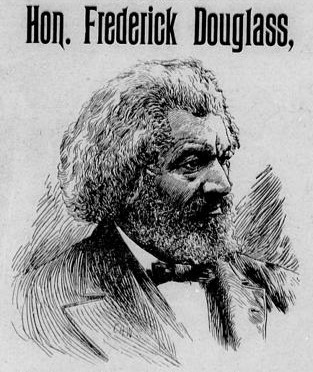Frederick Douglass, Staff Officer?
This Black History Month, learn how Frederick Douglass almost became a staff officer for Adjutant General of the United States, Lorenzo Thomas, to aid in the recruitment of U.S. Colored Troops for the Union Army.
In late July 1863, abolitionist, publisher, and Black leader Frederick Douglass went to Washington, D.C., where he met with President Abraham Lincoln. Although he was impressed with Lincoln’s sincerity and manner, Douglass was disappointed that the President was not willing to take more aggressive actions on behalf of Black soldiers in the Union army.
After his meeting at the White House, Douglass met with Secretary of War Edwin Stanton. According to historian Philip Foner, Stanton “promised him the rank of assistant adjutant on the staff of General Lorenzo Thomas,” who had been recruiting numerous Black regiments among the freedmen up and down the Mississippi Valley. By mid-August, just two months after Milliken’s Bend, Douglass was instructed to go to Vicksburg. He would be paid $100 a month. But whether he would remain a civilian, or become a commissioned officer, went unmentioned.
On August 16, 1863, he addressed his readers of the Douglass Monthly in his “Valedictory” explaining why he was ceasing publication: “I discontinue my paper, because I can better serve my poor bleeding country-men whose great opportunity has now come, by going South and summoning them to assert their just liberty….I am going South to assist Adjutant General Thomas, in the organization of colored troops, who shall win for the millions in bondage the inestimable blessings of liberty and country.”
Douglass fully expected to become a commissioned officer, based upon his earlier conversation with Stanton. But Assistant Adjutant General Charles W. Foster and Major George Stearns of Thomas’s staff mentioned nothing of it. Frustrated, Douglass soon realized the commission would not be forthcoming. Somewhere in the administration, there remained hesitation, fear, and prejudice. The machinery of government, in the Army, the War Department, or Lincoln’s White House, balked at what it would mean to commission a black man to a high-ranking post. Without a military commission, Douglass refused the assignment.
One can only imagine what the influence would have been had Douglass gone South to aid in the recruitment and training of the U.S. Colored Troops. It would have been a clear statement to both North and South that the United States intended to extend rights, position, and power to African Americans in a way never seen before. Had he done so, and had he received the administrative support and encouragement he deserved, it seems quite likely that he would have had an equally significant role to play in the nascent Freedmen’s Bureau, which was also forming in the Mississippi Valley at this time. The direct impact Douglass could have had as a Freedman’s Bureau administrator, especially in this region in the post-war years, could have changed the entire outcome of Reconstruction.
Sources: Philip S. Foner, ed. The Life and Writings of Frederick Douglass vol. 3 (NY: International Publishers, 1952) p. 37; 376. Frederick Douglass Papers Project, Indiana University-Purdue University Indianapolis (IUPUI).


Comments
Frederick Douglass, Staff Officer? — No Comments
HTML tags allowed in your comment: <a href="" title=""> <abbr title=""> <acronym title=""> <b> <blockquote cite=""> <cite> <code> <del datetime=""> <em> <i> <q cite=""> <s> <strike> <strong>